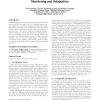22 search results - page 3 / 5 » Spike timing dependent adaptation for mismatch compensation |
85
Voted
ICNP
1999
IEEE
15 years 3 months ago
1999
IEEE
For wireless channels, interference mitigation techniques are typically applied at the packet transmission level. In this paper, we present the Havana Framework for supporting int...
ICANN
2003
Springer
15 years 4 months ago
2003
Springer
Many activity dependent learning rules have been proposed in order to model long-term potentiation (LTP). Our aim is to derive a spike time dependent learning rule from a probabili...
NIPS
2004
15 years 1 months ago
2004
The representation of acoustic signals at the cochlear nerve must serve a wide range of auditory tasks that require exquisite sensitivity in both time and frequency. Lewicki (2002...
FMOODS
2007
15 years 1 months ago
2007
Software adaptation aims at generating software pieces called adaptors to compensate interface and behavioural mismatch between components or services. This is crucial to foster re...
ICSE
2008
IEEE-ACM
15 years 11 months ago
2008
IEEE-ACM
VieDAME is a tool for monitoring and dynamic service adaptation of BPEL processes. The tool monitors partner service interaction to compute Quality of Service (QoS) data and perfo...

